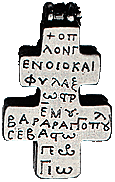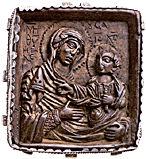 |
|
 |
The spiritual world in everyday life: beliefs and superstitions
 In the society of the Late Byzantine period,
In the society of the Late Byzantine period,
 the problems an individual encountered in his daily life, whether he was a layman, an intellectual, an aristocrat, or even the emperor himself, were not always given a single rational interpretation. The Byzantines believed that their troubles could be caused or cured in a magical way by the supernatural forces that exist in nature. They believed that there were demons (fallen angels, that is, whose punishement had made them malevolent) as well as other forces that caused illnesses or other harm to humans. They faced these forces in three ways: with curiosity, seeking to grasp the knowledge they concealed and to be able thus to predict the future, with fear and the desire to be protected from the harm they could cause, and finally with the will to use them, in order to influence certain situations that might concern their livestock, the problems an individual encountered in his daily life, whether he was a layman, an intellectual, an aristocrat, or even the emperor himself, were not always given a single rational interpretation. The Byzantines believed that their troubles could be caused or cured in a magical way by the supernatural forces that exist in nature. They believed that there were demons (fallen angels, that is, whose punishement had made them malevolent) as well as other forces that caused illnesses or other harm to humans. They faced these forces in three ways: with curiosity, seeking to grasp the knowledge they concealed and to be able thus to predict the future, with fear and the desire to be protected from the harm they could cause, and finally with the will to use them, in order to influence certain situations that might concern their livestock,
 their crops or their relationships with other people. their crops or their relationships with other people.
To achieve this, they performed certain magico-religious rites or used various objects, which they believed possessed supernatural properties by which they would obtain certain desirable results. Prayers and exorcisms were part of the rituals, while the art of divination was also practiced. The objects usually worn as charms or amulets were small crosses containing relics of saints, pieces of paper or papyrus inscribed with "magic" texts and symbols, old Byzantine coins pierced and worn around the neck, rings set with Christian icons and inscriptions or small icons of saints, such as those used today. Such objects have been found in excavations and are also mentioned indirectly, along with descriptions of the rituals, in various Late-
Byzantine texts.
There have also been found copies of books and manuals dealing with the evil eye, books on astrology and on the interpretation of dreams, as well as collections of exorcisms, all dating from that period.
|